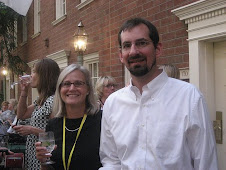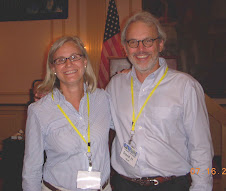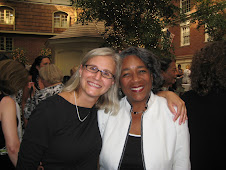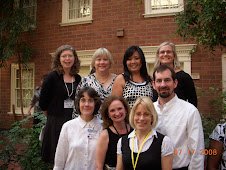Jim Hatten used the final word protocol twice this past unit with his sophomore English class and felt it went well. His sophomores discussed an article on cheating and then an article on environmental threats. Jim's also planning on using final word with his senior journalism class.
Jim projects a timer on his screen so that students can keep track their talking time.
Click here for a free, classroom timer to use on your computer.
Teachers with Interwrite pads also have a classroom timer as part of their gallery teaching tools. Projecting a classroom timer has a variety of uses to assist with classroom management.
Showing posts with label final word. Show all posts
Showing posts with label final word. Show all posts
Friday, October 26, 2007
Tuesday, October 16, 2007
Advanced Placement and Final Word Discussion
Lonni Skrentner, retired AP history teacher, submitted the following information about using the Final Word Discussion with her advanced placement students.
My favorite NUA strategy in Advanced Placement was “Final Word Discussion.” In that strategy, students read an article (something biased or analytical works best). While reading, they highlight sections (no more than two or three lines each) that they think are important, interesting, about which they have questions. I tell them to number the highlights they want to share – 1-2-3, so they have at least two back ups when someone in their group shares their highlight before it is their turn.
Using a deck of cards, “deal” your students into groups of no more than four. You decide which “suit” starts (you’ve culled your deck to include just enough cards for your class – so a class of 12 would only need aces, twos and threes – for an odd number choose a joker and let them pick a group to join). Tell groups their goal is decide on one highlight and a back-up to share with the whole class. Then the strategy works as follows:
My favorite NUA strategy in Advanced Placement was “Final Word Discussion.” In that strategy, students read an article (something biased or analytical works best). While reading, they highlight sections (no more than two or three lines each) that they think are important, interesting, about which they have questions. I tell them to number the highlights they want to share – 1-2-3, so they have at least two back ups when someone in their group shares their highlight before it is their turn.
Using a deck of cards, “deal” your students into groups of no more than four. You decide which “suit” starts (you’ve culled your deck to include just enough cards for your class – so a class of 12 would only need aces, twos and threes – for an odd number choose a joker and let them pick a group to join). Tell groups their goal is decide on one highlight and a back-up to share with the whole class. Then the strategy works as follows:
- First person shares a highlight with their rationale or question
- Each other person in the groups reacts to that person (I don’t get what you mean, I highlighted the same thing but because... etc.)
- The speaker gets the “final word,” a reaction to what their peers have said.
- Next person goes and so on.
- They decide which highlight they want to share in the large group – who will read, who will explain etc.
- Bring the class back together as soon as you realize most groups are finished sharing (with adults this strategy needs a timer because they will go on talking, but teens will probably be able to go twice around the group in 15 minutes or so!)
- Have each group share one highlight (make sure they say page number, column and approximate spot so students can follow along) – as teacher ask some clarifying, analytical or further descriptive questions.
Got questions? Want to brainstorm? Get a coach or colleague to sit down with you. Call Lonni Skrentner, retired EHS social studies teacher (952-946-1173, skrents@aol.com) and she’d be glad to come in on an off day during your prep.
Monday, August 27, 2007
Final Word Strategy Notes
During the debrief the Final Word on Baruti Kafele's "Managing Your Classroom," CoP members came up with the following ideas:
The Final Word strategy allows all students to speak, creating an equality of cultures. The strategy allows all ideas to be affirmed, and the sense of order is a classroom management tool itself.
Discussing Kafele's ideas sparked a lively discussion from "we resist rigid classroom management" to "we still struggle with managing a classroom." KC shared her three classroom rules: Work, Respect, Belong. The group liked the idea of keeping rules vague since teachers can't predict all of the infractions.
Jackie's Note: Although many folks were turned off by some of the specific ideas that Kafele proposes, the animated discussion and comments such as "I've always been afraid to talk about classroom management issues" and "The faculty needs to have a larger discussion of rules for consistency across classes" made the 25 minutes valuable for me. Thanks for your great discussion.
The Final Word strategy allows all students to speak, creating an equality of cultures. The strategy allows all ideas to be affirmed, and the sense of order is a classroom management tool itself.
Discussing Kafele's ideas sparked a lively discussion from "we resist rigid classroom management" to "we still struggle with managing a classroom." KC shared her three classroom rules: Work, Respect, Belong. The group liked the idea of keeping rules vague since teachers can't predict all of the infractions.
Jackie's Note: Although many folks were turned off by some of the specific ideas that Kafele proposes, the animated discussion and comments such as "I've always been afraid to talk about classroom management issues" and "The faculty needs to have a larger discussion of rules for consistency across classes" made the 25 minutes valuable for me. Thanks for your great discussion.
Sunday, August 26, 2007
Final Word Protocol
The CoP will be conducting a Final Word Protocol text-based discussion on a chapter by Baruti Kafele. Basically, a Final Word Protocol involves a group of four or five students responding to quotations that they found of particular interest in an assigned reading. The timed discussion allows for only one person to be speaking at a time, and the listeners must respond to specific comments made by the first speaker. Click here for a handout on Final Word Protocol instructions.
The Final Word Protocol forces all students/participants to listen carefully to the speaker because they need to respond to the speaker's comments. Often times people are thinking about what they will say when it's their turn to speak rather than listening to the speaker. Since all students must discuss the assigned text, students are more likely to read the assignment and be prepared because of peer pressure.
The Final Word Protocol is a culturally responsive strategy because all students are allowed to share their perspective.
If you use the Final Word Protocol in your classroom, be sure to click comments below to discuss the strengths and weaknesses of this strategy.
The Final Word Protocol forces all students/participants to listen carefully to the speaker because they need to respond to the speaker's comments. Often times people are thinking about what they will say when it's their turn to speak rather than listening to the speaker. Since all students must discuss the assigned text, students are more likely to read the assignment and be prepared because of peer pressure.
The Final Word Protocol is a culturally responsive strategy because all students are allowed to share their perspective.
If you use the Final Word Protocol in your classroom, be sure to click comments below to discuss the strengths and weaknesses of this strategy.
Labels:
culture,
final word,
language strategies,
reading
Subscribe to:
Posts (Atom)






